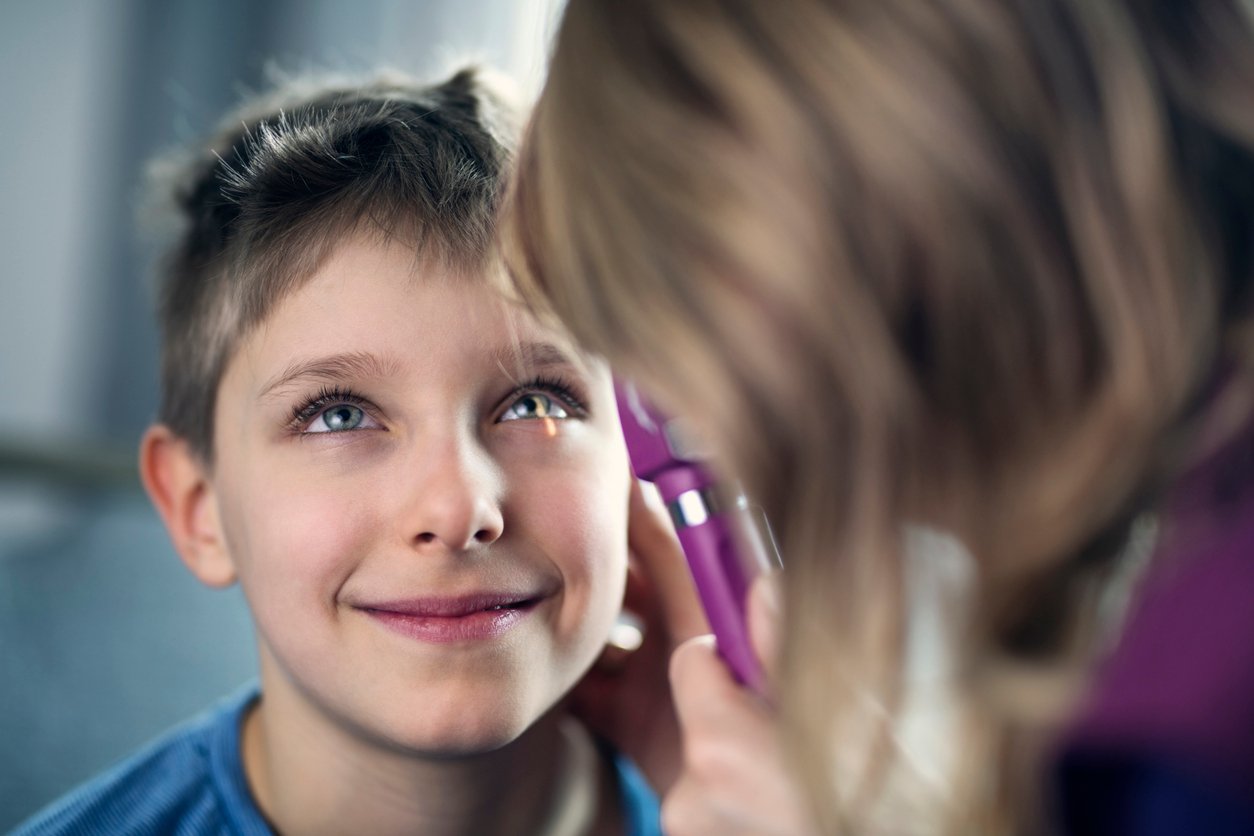Pediatric Retina Conditions Overview

Although rare, infants, children, and adolescents are susceptible to retina conditions typically occurring due to genetic predispositions, infection, injury, or prematurity. The retina is a thin layer of tissue at the back of the eye that converts light and color into electrical impulses to allow the brain to process visual information. Without a properly functioning retina, vision loss is probable. The retina is not fully developed until age 7, therefore it is important that pediatric retina conditions are diagnosed and treated as early as possible. Pediatric retina conditions vary in severity and differ from those affecting adults, consequently requiring individualized treatment and care.
Common Symptoms of Pediatric Retinal Conditions
While symptoms vary from patient-to-patient, typical signs of pediatric retinal diseases include:
- Pupils that appear white instead of red in photographs
- Poor night vision
- Sudden or unexplained vision loss
- Abnormal sensitivity to light
- Floaters within the field of vision
- Seeing “flashing lights”
- Changes in the appearance of the eye
If your child is experiencing any of these symptoms, see a retina specialist as soon as possible.
Common Pediatric Retina Diseases & Treatments
Retinoblastoma
Retinoblastoma is an eye cancer in which cancer cells form in the eye’s retina. This disease typically affects infants and children younger than 6. During these ages, the retina is developing, meaning cells are multiplying. When these cells continue to grow without dying off, a tumor forms. Most children with retinoblastoma have inherited a genetic mutation that prevents the retina cells from naturally dying, and therefore they continue to multiply. In some children, this mutation occurs spontaneously. According to the American Cancer Society, about 200 to 300 children in the United States are diagnosed with retinoblastoma. Parents may be able to identify retinoblastoma by noticing if their child’s pupils look white when light enters the eye.
If it is known that retinoblastoma runs your family, make sure to talk to your child’s doctor about regular eye exams. If diagnosed, treatment options are typically decided by both the parents of the patient and the healthcare providers.
Common treatments for retinoblastoma include:
- Surgery
- Radiation Therapy
- Laser Therapy
- Cryotherapy
- Chemotherapy
Treatment options may vary depending on patient preferences and the nature of the case.
Retinopathy of Prematurity (ROP)
If your child was born prematurely (before 30 weeks of pregnancy) or weighed less than 3 pounds at birth, they may be at increased risk for ROP. When a baby is born early, the blood vessels in the retina may grow abnormally. Some babies may have milder cases than others and may be able to heal without treatment.
If your infant has been diagnosed with an early stage of ROP, it is important to schedule regular examinations, as the disease can progress quickly. If the condition worsens, doctors may recommend:
- Laser treatment
- Anti-VEGF injections
- Eye surgery (if the retina has become detached)
Without proper treatment and/or monitoring, partial vision loss or blindness is probable.
Coats Disease
In Coats disease, the blood vessels in the retina form abnormally, causing leaking that leads to swelling, which can eventually cause partial or complete retinal detachment. Coats disease can develop slowly and affects both eyes; however, symptoms will most likely only develop in one eye. Diagnosis typically occurs between the ages of 8 and 16, however, in some cases, symptoms can begin at age 30 or later.
Coats disease can often be confused with retinoblastoma, therefore it is important to see a retina specialist for proper diagnosis. If caught early, laser treatment or injections may be suggested to shrink and/or destroy abnormal blood vessels. However, if the disease has progressed, and retinal detachment has occurred, surgery is likely. There is no cure for Coats disease, but early treatment can increase the chances of retaining eyesight.
Schedule a Consultation for Pediatric Retinal Care in Long Island and Queens, NY
Thankfully, most pediatric retina diseases are rare, however, it is never a bad idea to remain attentive to a child’s eye health. If you live in Queens, Long Island, or elsewhere in the New York City metropolitan area and believe your child may be suffering from a pediatric retina condition, contact Vitreoretinal Consultants of NY today.


